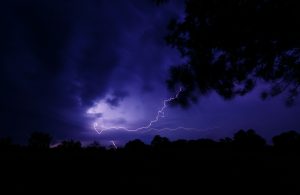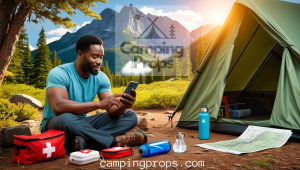How Risky is Camping? Understanding the Dangers and Safety Concerns
How risky is camping? Many outdoor enthusiasts wonder about the potential dangers of spending a night in nature. While camping is generally considered a safe activity, how risky is camping really when you factor in the dangers of the outdoors? Understanding these risks and how to mitigate them is essential for a safe and enjoyable experience. Whether you’re an experienced adventurer or a first-time camper, it’s crucial to be prepared. Let’s explore how risky camping can be and how you can minimize these risks to enjoy the outdoors without worry.
How Risky is Camping? : Weather Hazards
- Risks: Sudden rainstorms, lightning, extreme heat, or cold can turn a peaceful camping trip into a dangerous experience. When thinking about how risky camping can be, weather hazards are one of the top concerns.
- How to Minimize:
- Always check the weather forecast before heading out to understand how risky camping can become in adverse conditions.
- Pack versatile clothing and gear to prepare for unexpected weather shifts, such as rain jackets or thermal layers.
- Avoid camping in low-lying areas that are prone to flooding, especially if you’re concerned about how risky camping can get in certain areas.
How Risky is Camping? : Wildlife Encounters
- Risks: From bears and raccoons to snakes and insects, wildlife is an unavoidable part of camping, and some animals can pose a threat if not managed carefully. This is an important consideration when asking how risky is camping in the wild.
- How to Minimize:
- Store food in bear-proof containers or hang it from a tree far away from your campsite.
- Keep your campsite clean and free of food scraps to reduce the chance of attracting wildlife, ensuring how risky camping is doesn’t become an issue due to animal encounters.
- Avoid setting up camp near animal trails or dens.
How Risky is Camping? : Injuries and Accidents
- Risks: Sprains, cuts, burns, or falls are common injuries when camping, especially on uneven or unfamiliar terrain. How risky camping can be increases when you’re unprepared for potential accidents.
- How to Minimize:
- Wear proper footwear and always be cautious on uneven or rocky terrain.
- Use tools like knives and fire responsibly, and keep them safely out of reach of children.
- Carry a well-stocked first aid kit and familiarize yourself with basic first aid techniques before you go camping, knowing how risky camping can get without proper care.
How Risky is Camping? : Getting Lost
- Risks: One of the greatest fears when camping is losing your way, especially in dense forests or remote areas. Knowing how risky camping is when you’re unfamiliar with the area is essential.
- How to Minimize:
- Always carry a map, compass, or GPS device and ensure you know how to use them.
- Stick to marked trails, and make sure to inform someone about your camping route and expected return.
- Carry a whistle to signal for help in case you get lost or need assistance.
How Risky is Camping: Fire Hazard

- Risks: Campfires are a camping tradition, but they can easily become a dangerous hazard if not managed properly. The question of how risky camping can be when it comes to fire hazards is an important one.
- How to Minimize:
- Build fires only in designated fire rings or pits to keep them contained.
- Always have a water source or fire extinguisher nearby in case the fire gets out of control.
- Fully extinguish fires by pouring water over them and stirring until there is no heat remaining.
How Risky is Camping: Insect and Plant Risks
- Risks: Mosquito bites, tick exposure, or contact with poisonous plants like poison ivy can cause a variety of problems, from discomfort to severe allergic reactions. How risky is camping without taking precautions against insects and plants?
- How to Minimize:
- Use insect repellent and wear long sleeves and pants, especially during the evenings when insects are most active.
- Learn how to identify poisonous plants and stay away from them.
- Regularly check yourself for ticks and remove them properly to avoid potential diseases.
How Risky is Camping: Water-Related Risks
- Risks: Swimming in unfamiliar waters or consuming contaminated water is a serious concern when camping. Drowning or waterborne illnesses are how risky camping can get if you’re not careful with water safety.
- How to Minimize:
- Avoid swimming in unregulated or unfamiliar waters, especially if the current is strong or the water is murky.
- Always purify water from natural sources before drinking it by using filters, boiling, or water purification tablets.
How Risky is Camping: Fatigue and Dehydration
- Risks: Overexertion can lead to fatigue or dehydration, especially during strenuous activities or in hot, dry conditions. How risky camping becomes in these conditions depends on how well you manage your energy levels.
- How to Minimize:
- Always drink plenty of water, and take regular breaks to avoid physical exhaustion.
- Pack energy-rich snacks and meals to keep your energy levels high during the day.
- Don’t push yourself too hard, especially in hot or high-altitude environments.
How Risky is Camping: Theft or Human-Related Risks
- Risks: Camping in crowded or public areas can expose you to theft or other human-related concerns, especially if safety is not a priority in the area.
- How to Minimize:
- Keep valuables locked in your car or hidden in your tent to reduce the risk of theft.
- Choose well-regulated camping areas with good reputations and security if you’re concerned about safety.
- Trust your instincts and stay aware of your surroundings at all times.
How Risky is Camping: Lack of Preparedness
- Risks: Forgetting essential gear or not knowing how to use it can lead to discomfort or even danger during your camping trip. Proper planning is the key to reducing how risky camping can be due to lack of preparedness.
- How to Minimize:
- Plan your trip ahead of time and create a checklist of necessary camping gear.
- Practice setting up your tent and using your gear before your trip to avoid surprises.
- Research your destination and understand any potential risks in the area.
Conclusion
While camping does come with risks, most of these dangers can be minimized with proper preparation and knowledge. By understanding how risky camping can be, and taking proactive steps to ensure safety, you can enjoy a rewarding experience in the great outdoors. Remember, the key to a successful camping trip is vigilance, respect for nature, and careful planning.
Ready to elevate your outdoor adventure? Discover the must-have gear that turns a simple camping trip into an unforgettable experience – click here to explore the ultimate camping equipment guide!
🧯 Safety Statistics & Tips
-
National Park Service – Campground Safety
https://www.nps.gov/yell/planyourvisit/safety.htm
Official guide on safety practices in campgrounds. -
American Camp Association – Risk Management
https://www.acacamps.org/resource-library/articles/risks-responsibility
Focuses on identifying and minimizing risk while outdoors. -
Backpacker – 10 Most Common Camping Accidents (and how to avoid them)
https://www.backpacker.com/survival/survival-skills/the-10-most-common-camping-mistakes-and-how-to-avoid-them/
Covers real-world mistakes and prevention tips.






Leave a Reply